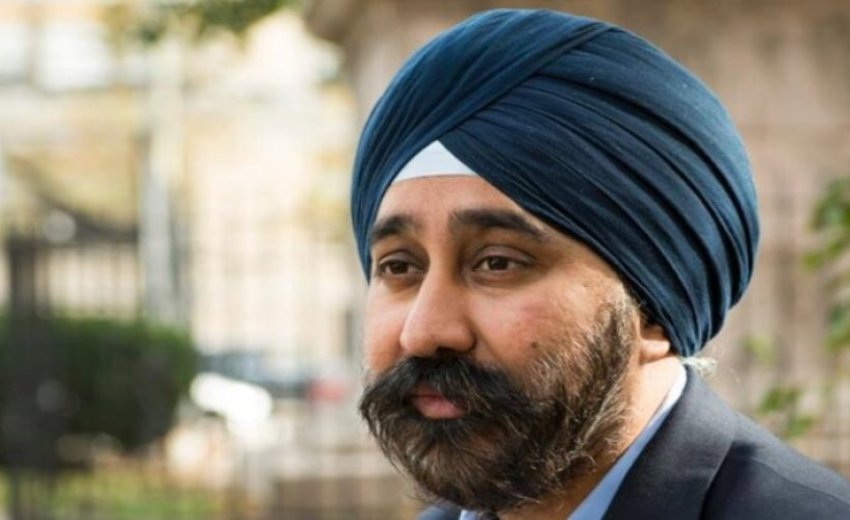Ravi Singh Bhalla, who grew up in a Sikh family, faced discrimination in his small town.
Ravi Bhalla moved to Hoboken, New Jersey, as a recent law school graduate with the intention of staying for a few years and saving money on rent by not residing in New York City. He said, “ I found a nice space, and, you know, at 25 years old, I didn’t know who the mayor was.” Now, more than two decades later, Bhalla is still in Hoboken — and running for his second term as the city’s mayor.
Becoming the first Sikh to hold elected office
Being the first Sikh person to ever hold public office in the state of New Jersey, Bhalla, a Democrat, has made combating bigotry one of his top priorities. His first act as mayor, when he got sworn in on January 1, 2018, was to drive straight from home to his office and sign an executive order declaring Hoboken a fair and welcoming community.
Bhalla has built deep ties with the Jewish community in the city, including outreach in the wake of the horrific shooting that took place in 2018 at the Tree of Life synagogue in Pittsburgh and the massacre that took place in 2019 at a Jersey City kosher supermarket in 2019.
Since Bhalla is immediately identified as Sikh due to the fact that he wears a turban, he is a potential target for religious prejudice. A few days before he was elected, there were flyers that stated, 'Don't let terrorists take over this town,' trying to correlate his appearance with terrorism. Bhalla says that he always teaches his children that they should take pride in who they are, including how they present themselves to the world.
The turban-removing incident that shook him to the core
During the early stages of his career as an attorney, Bhalla achieved a very personal and very public victory for religious liberty. While visiting an inmate client, prison guards demanded that he remove his turban for a search, despite the fact that he had not set off the metal detector. Bhalla successfully argued that the demand violated his constitutional right to freedom of religion. After that, he filed a complaint against the Federal Bureau of Prisons, claiming that they had violated his constitutional rights. Immediately after that, the Bureau altered its policy so that religious clothes would no longer be included in the routine inspections of personal belongings conducted by guards, with the exception of situations in which the person wearing the garments set off the metal detector.
In an interview with New York Times in 2003, Bhalla said, “ To a Sikh, removing his turban in public is the same as a strip-search and as intrusive as asking a woman to remove her blouse.” The decision of the court additionally made it quite clear that prayer shawls and yarmulkes would not be subject to enhanced security procedures.
After having a difficult childhood in which he frequently experienced a sense of alienation from his peers, Bhalla says that it did not immediately occur to him to be proud of his Sikh identity. Bhalla said that there are only two possible outcomes that might result from the accumulation of experiences. While some people could feel embarrassed about who they are, the other possible effect is that it strengthens the character and helps one see the significance of one’s identity, both of which are good things that might come from it.
Experience as an Indian Sikh immigrant
Bhalla’s parents ,who were Indian immigrants ,lived in Montville Township, Morris County, New Jersey.They were the only Sikh family in the neighbourhood, and Bhalla recognised it. But they never concealed their true identity.
Growing up in a predominantly white community, Bhalla remembers having the darkest complexion than anyone in his school. He was frequently called the N-word because these youngsters had never met somebody who wasn't white. Bhalla and his brother were educated by their parents not to accept such abuse. His mother, he recalled, gave them permission to physically protect themselves if somebody touched their religious objects. When the instructor notified Bhalla's mother about the event, she defended him. Once, he was disciplined at school for a "scuffle" with another student who had touched his hair. Bhalla claimed that his mother clarified, “I gave him full permission to defend himself, because it’s really to protect what we deem sacred in our faith community,”
Finding Sikh brotherhood
Bhalla found a genuine Sikh community for the first time during his student years at the University of California, Berkeley. Bhalla stated that there were not many, but enough for my faith community to organise a student organisation advocating for Punjabi language lessons to be offered at the institution. His education included a master's degree at the London School of Economics and law school at Tulane University, which offered a law-focused study abroad programme. One of them was in Israel, which allowed students to study comparative American and Israeli law, Bhalla explained. As a religious person, he was also drawn to the nation, although his religion was not one of the three monotheistic faiths represented in Jerusalem. The experience left a strong impression on him.
Once Hoboken became his home and he started a family, he maintained his political involvement. When Bhalla's legal firm defended a city council member in a municipal matter, he realised that the issues that touched him and his family the most were not the large, national-level controversies, but rather local-level policy issues such as zoning, density, and land use.
Bhalla said that he realised that there was so much ineptitude and incompetence and patronage cronyism, and so much corruption, and that it was actually impacting his property taxes and quality of life.
In 2009, he was given the responsibility of serving the council, which he continued to do until he was elected mayor in 2017.
The Democratic mayor of neighbouring Jersey City, Steven Fulop, told JI that he and Bhalla first linked when they stood for their respective city councils, each of them taking on established interests in the area. Bhalla was one of the candidates challenging these interests.
Bhalla's council responsibilities involved "extremely localised issues. We had a hospital that was in trouble, and we needed to make an economic turnaround," he stated, adding that "organising our finances was crucial." He commented that Hoboken is a popular area to live, especially for those who desire proximity to Manhattan without the price tag – the same reason he moved there in the first place. There was a time when nobody wanted anything to do with Hoboken. It was a depressed, industrial city. Maintaining urban expansion at acceptable levels and making the city a desirable place to settle and raise a family are his goals.
Focusing on supporting culturally diverse communities
Bhalla has also made an effort to show consideration for the various communities that make up the city, such as the Jewish community. In 2020, he became a supporter of the initiative known as Mayors Together Against Antisemitism, which was spearheaded by the American Jewish Committee and the United States Conference of Mayors.
The Anti-Defamation League reported a 73% increase in antisemitic events in New Jersey between 2018 and 2019. The initiative now includes over 620 mayors from 49 states and the District of Columbia. Levy remarked, "Since he is a member of another religious minority, he understands the specific requirements of the minority communities in such a diversified community."
Bhalla has become acquainted with the local Jewish community, meeting with members to celebrate holidays such as Hanukkah and to face challenges like antisemitism. His daughter attended a Jewish preschool in the city, and he has talked with the parents of her classmates who were absolutely frightened of a massacre being repeated here in Hoboken, he observed.
After the shooting at a Jewish grocery shop in Jersey City in December 2019, Hoboken police officers were dispatched to assist as first responders. Bhalla additionally spoke with Jewish leaders following the tragedy. The Hoboken community was understandably terrified. They had to increase security patrols at local synagogues.
Bhalla joined up for an AJC trip to Israel that connected American mayors with their Israeli counterparts after the shooting. However, the trip was cancelled due to the coronavirus pandemic, which Bhalla said has been his greatest struggle as president. When they had just one case of COVID in mid-March of 2020, he was the first mayor in the country to close pubs and eateries.
Bhalla shares that he was always advised by people that he was doing political suicide by taking such politically driven initiatives. However, he says that all the effort is worth it if he saves even one life throughout his political career.
*Based on an article by Gabby Deutch, published in Jewish Insider on 5th May 2021

